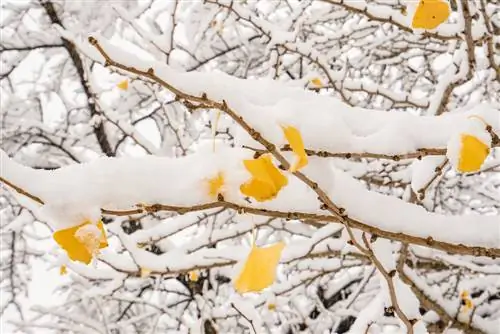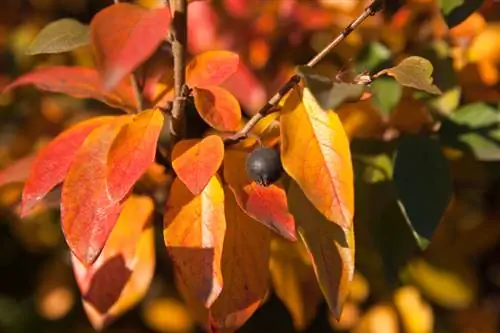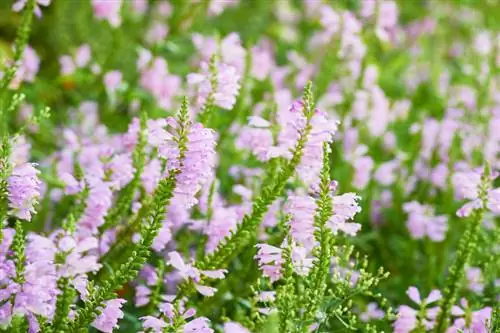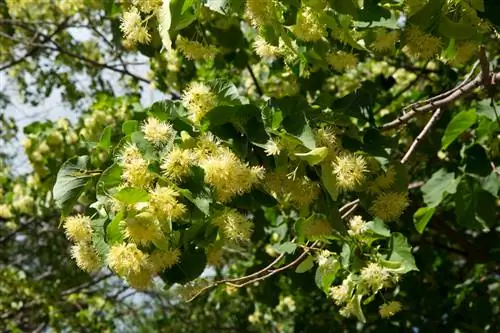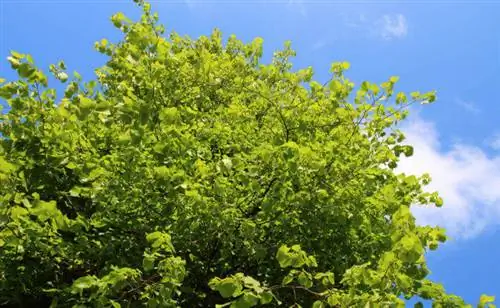- Author admin leonars@hobbygardeners.com.
- Public 2023-12-16 16:46.
- Last modified 2025-01-23 11:21.
No question: a tree belongs in every garden. However, you won't be able to enjoy it for too long if the carefully selected specimen soon dies due to a lack of winter hardiness. Alternatively, you would have to make great efforts every winter to protect the tree from frost damage.
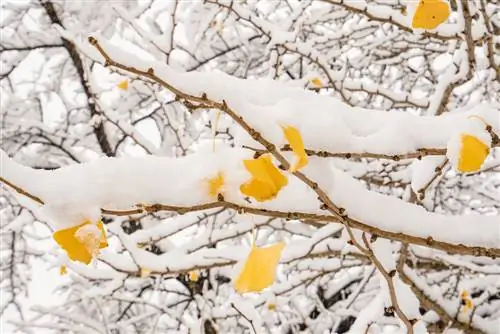
Which trees are winter-proof for the garden?
Winter-resistant trees for the garden include both native species such as apple, birch or oak as well as winter-resistant exotic trees such as sweetgum, ginkgo or tulip trees. These trees survive frosty temperatures without special protection.
Native trees survive every winter
You are guaranteed not to go wrong with native deciduous and coniferous trees, as they are perfectly adapted to the prevailing climate and therefore do not require any special protective devices. In addition, native species provide birds, insects and other animals with both a habitat and food - an advantage that should not be underestimated and that many exotic species unfortunately do not have. The ubiquitous, exotic cherry laurel, for example, has a lot of properties that are well received by gardeners - but from an ecological point of view the shrub is worthless. Instead, choose a house tree from this very varied list of the most common species found in Germany:
- Fruit trees: apple, pear, sweet and sour cherries, plums and plums, reindeer and mirabelle plums, walnut
- Wild fruit trees: spar, mountain ash (rowanberry), serviceberry, cornelian cherry, wild apple
- Deciduous trees: maple, birch, beech, oak, alder, ash, hornbeam, chestnut, linden, poplar, willow, hawthorn, elm
- Evergreen deciduous trees: holly, evergreen oak
- Coniferous trees: yew, spruce, pine, larch, fir, juniper
Winter-proof exotic plants for the home garden
There are also numerous imported tree species, some of which have been successfully cultivated in German gardens for decades or even centuries. As a rule, species such asare winter-proof and therefore completely problem-free.
- Amber tree (Liquidambar styraciflua)
- Chinese bluebell tree (Paulownia tomentosa)
- Chestnut (Castanea sativa)
- Ginkgo (Ginkgo biloba)
- Gleditsia triacanthos)
- God's Tree (Ailanthus altissima)
- Japanese maple / fanleaf maple (Acer japonicum)
- Caucasian wingnut (Pterocarya fraxinifolia)
- Plane tree (Platanus acerifolia)
- Robinia (Robinia pseudoacacia)
- Japanese string tree (Styphnolobium japonicum)
- Trumpet tree (Catalpa bignonioides)
- Tulip tree (Liriodendron tulipifera)
Origin provides information about winter hardiness
If you are unsure about the winter hardiness of the tree you have selected, just take a look at the climatic conditions in its homeland: Which climate zone does the species come from? You will not be able to cultivate tropical and subtropical species in the garden in this country; you usually have to keep them in pots and hibernate frost-free during the winter months. The same applies to trees from the Mediterranean region, such as almost all types of citrus. Only the three-leaf orange (Poncirus trifoliata) can tolerate a few degrees below zero for short periods.
Tip
The various types of magnolias, some of which are also grown tree-like, are generally quite unproblematic.

